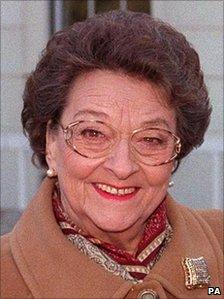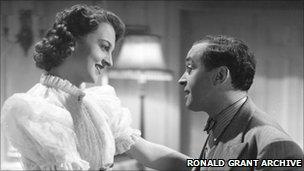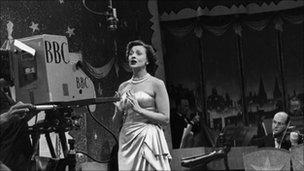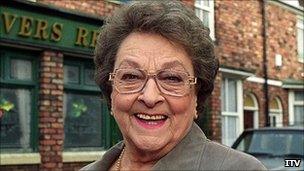Obituary: Betty Driver
- Published

From music hall to Rovers Return
During more than four decades in Coronation Street, Betty Driver became something of a national treasure.
Her character Betty Turpin, later Betty Williams, was one of the soap's longest serving names, the creator of pies and hot pots par excellence.
Yet, when she arrived at the Rovers Return in 1969 she had already been in showbusiness for more than 40 years as an actress, singer and entertainer.
Elizabeth Mary Driver was born in Leicester on 20 May 1920 the daughter of a policeman. The family moved to Manchester when she was just two years old.
She had an unhappy childhood. Her parents showed little affection to either Betty or her younger sister Freda and her mother Nellie, who Driver believed never wanted children, was quick to administer harsh discipline to both her daughters.
"We never got a kiss. We never got a present, nothing. My mother was so strong that my dad just gave up. He was a sweet person but he just gave up."
At the age of eight she discovered that she could sing and her mother immediately began forcing her to enter a string of talent contests. By the time Driver was 12, she was touring around the UK and having to attend a different school every week.
During an appearance on the BBC's Desert Island Discs in 2011 Driver said she believed her mother was attempting to compensate for her own failures by forcing her daughter to perform.
Film role
"I think she always wanted to be on the stage and never really achieved anything. And that was the nearest thing -- bunging me on, a little girl."
In her autobiography she described how her mother once slapped her because she refused to go on stage and she eventually appeared in front of the audience with the mark of her mother's hand on her face.

Starring in the film Let's Be Famous in 1939
When she was just 14 she was given the leading role in the revue, Mr Tower of London, and was spotted by George Formby who cast her in his new film Boots! Boots!
Her scenes as a cabaret singer ended up on the cutting room floor after Formby's wife, Beryl, who was also appearing in the film, decided she was not going to be upstaged by the younger girl.
The producers left Driver's name on the credits despite her non-appearance and, many years later, the film was re-released on DVD with Driver's scenes restored.
Although she was earning between £50 and £150 a week her mother spent most of it on clothes, drink and cars, giving her daughter just a small weekly allowance.
Recording
It was not until she was 21 that Driver finally gained control of her own finances and shook off her mother's influence.
In 1940 Driver became a big band singer and toured extensively with the Entertainments National Service Association (ENSA) appearing in shows for the troops.
Among her fellow artistes was a young Julie Andrews who, Driver later recalled, shared her dressing room at the Coventry Hippodrome on the night that the city was subjected to a massive German bombing raid.
Driver had made her first recording, Jubilee Baby, at the age of 14 and went on to make a number of hit records as well as appearing in some largely forgotten comedy films.

Performing on BBC TV in 1950
After the war she continued touring and appeared in her own BBC radio show, A Date With Betty, which was broadcast live. Much of her script was penned by an up and coming young writer named Bob Monkhouse.
In 1953 Driver married Wally Petersen, a South African singer who had guested on one of her shows but the union was not a success, Peterson was a serial womaniser and made free with Driver's money. The couple parted in 1960.
In 1964 Driver was asked to come out of a self-imposed retirement and audition for the part of Hilda Ogden in Coronation Street.
She lost out to Jean Alexander but, a year later, was cast in a series called Pardon the Expression, a comedy spin off from Coronation Street starring Arthur Lowe.
Hot Pot
Lowe had a reputation for being very difficult to work with. Driver damaged her back after a scene in which she was supposed to throw him and decided to call it a day.
An operation on her vocal chords had cut short her singing career so she decided to quit showbusiness and began running a pub with her sister, Freda.
The Coronation Street producers were back in 1969 to ask her to play the part of policeman's wife Betty Turpin on what was initially a three-month contract.
"I thought, why not," Driver later recalled. "It'll make a break for a while. That was in 1969 and the rest is history."
She was still pulling pints at the Rovers more than 40 years later having become one of the longest-serving cast members of the popular soap.

Stalwart of the Street
Her character's hot pots achieved legendary status, even going on sale to the public when a food firm snapped up the rights to use the name. Driver herself admitted that, in real life, she was an awful cook and had no idea how to prepare the dish that had made her famous.
By the time the soap entered the new millennium, audience research established that her character was one of the best loved on British television.
During her appearance on Desert Island Discs in 2011 she described the family atmosphere among the cast of Coronation Street and the great friendships she had made in her 40 year tenure.
On the cobbled streets of Weatherfield, Driver seemed to have found the security and support that had been so elusive during her early days in showbusiness.